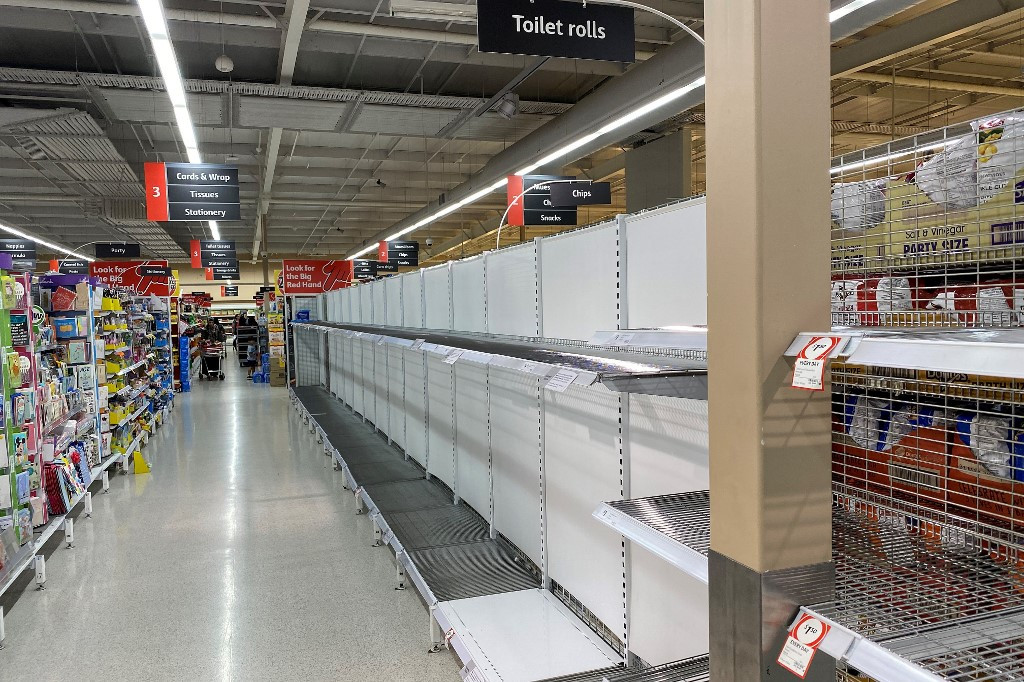Popular Reads
Top Results
Can't find what you're looking for?
View all search resultsPopular Reads
Top Results
Can't find what you're looking for?
View all search resultsAustralia’s economy set for first recession since 1991: McIntyre
Gross domestic product will fall 0.4 percentage point in the first three months of the year and 0.3 percentage point in the second quarter, ending a 28-1/2-year stretch of economic growth, he said in a report Monday.
Change text size
Gift Premium Articles
to Anyone
 Shelves usually stocked with toilet rolls are seen empty in a supermarket following panic buying in Sydney on March 8, 2020. A fight over toilet paper in an Australian supermarket on March 7 prompted police to call for calm after the latest violence sparked by coronavirus-induced panic buying in the country. (AFP/ Saeed KHAN)
Shelves usually stocked with toilet rolls are seen empty in a supermarket following panic buying in Sydney on March 8, 2020. A fight over toilet paper in an Australian supermarket on March 7 prompted police to call for calm after the latest violence sparked by coronavirus-induced panic buying in the country. (AFP/ Saeed KHAN)
A
ustralia’s economy will record its first recession since 1991 as the hit from China’s virus-induced slowdown is amplified by slumping confidence and domestic disruptions as the outbreak intensifies Down Under, according to Bloomberg Economics’s James McIntyre.
Gross domestic product will fall 0.4 percentage point in the first three months of the year and 0.3 percentage point in the second quarter, ending a 28-1/2-year stretch of economic growth, he said in a report Monday.
“Isolations and domestic disruptions to contain the spread of the virus will have a mounting economic impact, which is likely to result in a further GDP contraction in 2Q and potentially beyond,” McIntytre said. “Stimulus, both fiscal and monetary, will help to reduce the damage, but is unlikely to be enough to offset the impacts.”
McIntyre forecasts GDP to grow by 0.4 percent in 2020, some 1.5 percentage points below his pre-coronavirus forecast.
The Reserve Bank cut interest rates last week and money markets are pricing in a further reduction in April, which would bring it to the estimated lower bound of 0.25% and open the door to unconventional policy. The government is finalizing a fiscal “boost” that could amount to A$10 billion ($6.6 billion) to support firms struggling with cash flow and help them keep on employees.
McIntyre predicts large budget deficits ahead as the automatic stabilizers -- increased welfare payments and reduced tax collection -- begin to take hold. That’s on top of the fiscal stimulus needed to boost demand and confidence.
The Treasury and RBA estimate the impact on tourism and education from China’s shutdown and other virus fallout will cut 0.5 percentage point from GDP in the first quarter. That doesn’t include supply chain disruptions and is in addition to a 0.2 point cut from wildfires over summer.
Read also: Virus puts globalized economy at risk, says OECD chief economist
McIntyre said the comparison with the 2003 SARS epidemic is problematic because of the massive increase of China’s importance to both the Australian and global economies. He notes that in the Australian Dollar Trade-Weighted Index of the exchange rate, the weighting of the renminbi rose to 30 percent, higher than any other currency in the 36-year history of the gauge.
McIntyre notes that the channels through which the reduction in domestic activity transmits during a pandemic were laid out in a 2006 Treasury paper whose author is Steven Kennedy, the current secretary to the Australian Treasury. That analysis saw the economy contracting 5% in the first year.
Transmission of the virus in Australia is now occurring, meaning disruptions and shutdowns of aged-care facilities, child-care centers and schools. Health authorities anticipate several months of disruptions from the virus.
McIntyre predicts the economy will bounce back, noting that fourth-quarter GDP released last week showed several segments turning around, including housing and mining investment. China is also set to stimulate its economy, which traditionally benefits Australia.
Property prices Down Under have surged since late last year when the RBA resumed easing.
“How Australia’s housing market weathers the virus outbreak will be a key area of interest given the earlier downturn in construction activity,” he said. “Australia’s resources sector also stands well placed to benefit from a resumption of activity in China’s construction sector and stimulus measures.”









